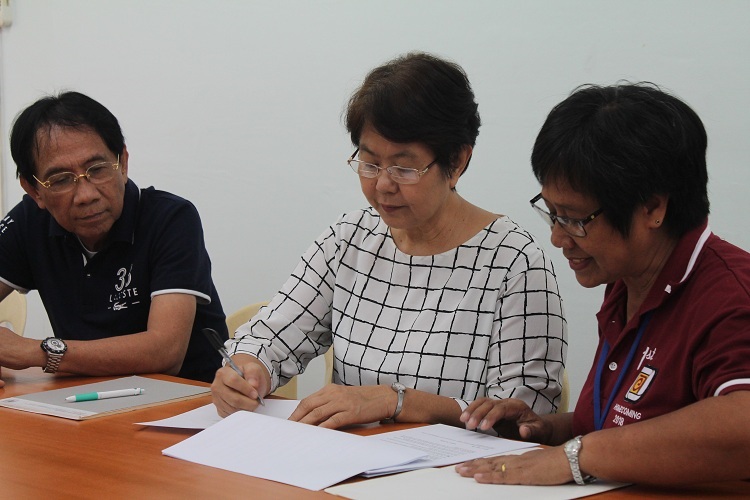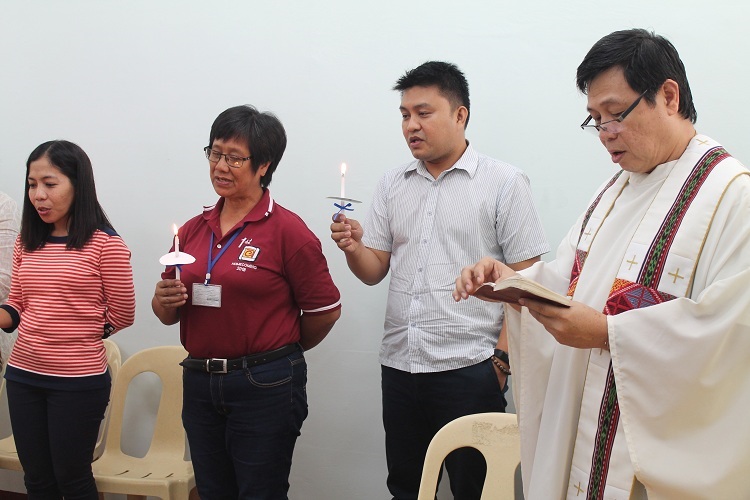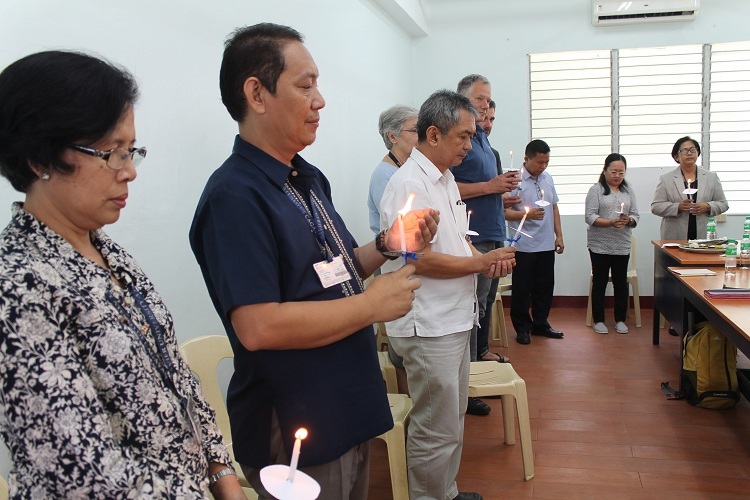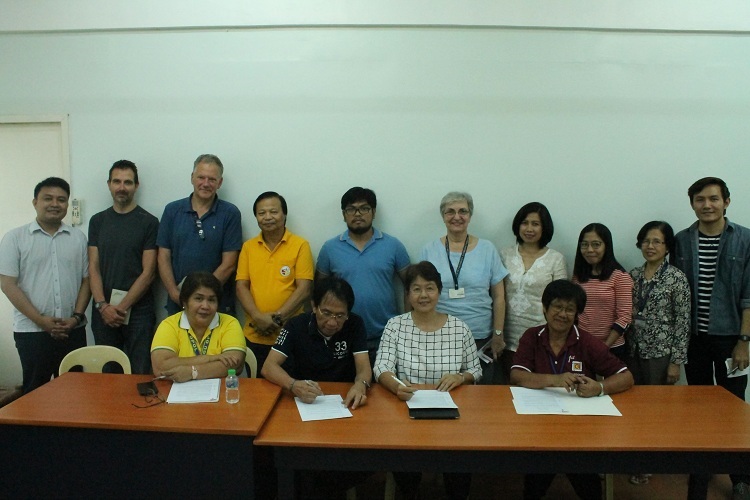
AGREEMENT. (From left to right) Opol Mayor Maximino Seno, XU’s vice-president for basic education Dr Dulce Dawang, and BIMWAM project coordinator for the south Dr Guadalupe Calalang are the principal signatories of the memorandum of agreement between the Municipality of Opol and BIMWAM research team. Photo by Rogelio Amarille.
CAGAYAN DE ORO CITY, Philippines — The project dubbed as “Building up an Integrated Methodology for Water Resources Assessment and Management in Urban Coastal Areas” or BIMWAM has recently established ties with the local government unit (LGU) of the Municipality of Opol and the Opol Waterworks Cooperative (OPWACO) for research and community empowerment.
BIMWAM, LGU Opol, and OPWACO signed a memorandum of agreement (MOA) on Wednesday, July 4 to formalize their respective roles and commitments in the said project. The Office of International Cooperation and Networking (OICN) of Xavier University - Ateneo de Cagayan facilitated the event.
The principal signatories of the MOA were Opol Mayor Maximino Seno, XU’s vice-president for basic education Dr Dulce Dawang (on behalf of XU president Fr Roberto Yap SJ), and BIMWAM project coordinator for the south Dr Guadalupe Calalang.
“I am thankful for this opportunity to collaborate with Xavier University and our partners from Belgium,” Seno said. “We hope this project will be successful and to be beneficial to the people of Opol.”
BIMWAM aims to develop a methodology to assess the water resources, potential, and quality in urban coastal areas, particularly in the municipalities of Opol and Medina (both are parts of Northern Mindanao region), by reinforcing the local scientific capacities and expertise.
On January 24 this year, BIMWAM and Medina Rural Waterworks and Sanitation Cooperative (MERWASCO) signed a similar MOA for the Municipality of Medina area.
Water resource assessment
The group also targets to empower water cooperatives and other LGUs by improving their strategies regarding sustainable water management through the implementation of a dedicated decision-making tool under the supervision of Xavier Ateneo.
Besides XU, University of St La Salle, Université de Namur, Catholique Université de Louvain, and Université de Mons of Belgium are instrumental in enabling this research project to be implemented in Opol and Medina.
Dr Vincent Hallet of Université de Namur, in his presentation in January this year, showed the Geographic Information System (GIS)-generated maps and instruments to be used to measure water quality of groundwater and intrusion of saltwater, among other factors.
Hallet said that due to the high probability of the intrusion of salt water, it is harder to access potable groundwater in coastal areas. One of the challenges of this project is to locate and map out water sources in the municipalities and determine their quality.
He added that BIMWAM could serve as a prototype of a standardized methodology for water resource assessment that could be replicated in Cagayan de Oro and other coastal communities in Mindanao.

OFFICE BLESSING. Fr Mars Tan SJ (rightmost), rector of the Loyola House Jesuit Community, leads the blessing of the BIMWAM office, located on the second floor of the XU Agriculture building. Pictured here are (from left to right) Dr Ana Rosa Carmona of USLS, BIMWAM project coordinator for the south Dr Guadalupe Calalang, PhD in Economics scholar Adrian Agbon, and Tan. Photo by Rogelio Amarille.
Xavier Ateneo and LGU Opol
Based on the agreement with LGU Opol, Xavier Ateneo, through the BIMWAM research team, will provide technical experts to implement the project activities.
The university will also train LGU Opol’s technical employees, who are assigned to groundwater and water quality monitoring, on basic hydro and hydrogeological concepts to improve their monitoring approaches and management.
On the other hand, LGU Opol agreed to grant access to the BIMWAM project researchers to do quantity and quality assessments of their water sources, facilities, and distribution networks such as pump testing, water sampling and monitoring, tracer tests, water technical audits, and other relevant information.
LGU Opol is also committed to safeguarding the BIMWAM monitoring equipment to be installed in the area and to assigning the Office of the Municipal Engineer to coordinate with Xavier Ateneo in making logistical arrangements for field visits and other activities.

OFFICE BLESSING. Select members of the faculty and staff of Xavier Ateneo along with guests attend the blessing of the BIMWAM office, located on the second floor of the XU Agriculture building.
Xavier Ateneo and OPWACO
The agreement between Xavier Ateneo and OPWACO specified that the university, through the BIMWAM research team, will ensure the smooth implementation of the project and train OPWACO technical personnel on basic hydro and hydrogeological concepts and monitoring.
OPWACO, in turn, will grant the BIMWAM research team access to their existing data on water tariffs, water distribution, cost of operations, and other relevant information.
OPWACO also commits its resources in the conduct of the research activities in Luyong Bonbon, Opol including the security to the BIMWAM monitoring equipment installed in the area.

COLLABORATION. Xavier University through the BIMWAM project, LGU Opol, and cooperatives join hands to develop the methodology to assess water resources in MisOr coastal communities. Photo by Rogelio Amarille.
Blessing of BIMWAM office
Before the MOA signing on July 4, the BIMWAM office, located on the second floor of the XU Agriculture building, was officially blessed by Fr Mars Tan SJ, rector of the Loyola House Jesuit Community.
During the blessing, Adrian Agbon, one of the two PhD scholars of the BIMWAM project, read the “Issue of Water” section of Pope Francis’ encyclical letter titled “Laudato Si’” (On Care for Our Common Home):
"Other indicators of the present situation have to do with the depletion of natural resources. We all know that it is not possible to sustain the present level of consumption in developed countries and wealthier sectors of society, where the habit of wasting and discarding has reached unprecedented levels. The exploitation of the planet has already exceeded acceptable limits and we still have not solved the problem of poverty.
“Fresh drinking water is an issue of primary importance since it is indispensable for human life and for supporting terrestrial and aquatic ecosystems. Sources of fresh water are necessary for health care, agriculture, and industry. Water supplies used to be relatively constant, but now in many places, demand exceeds the sustainable supply, with dramatic consequences in the short and long term. Large cities dependent on significant supplies of water have experienced periods of shortage, and at critical moments these have not always been administered with sufficient oversight and impartiality…”
For the BIMWAM project, Agbon (PhD in Economics scholar) is assigned to conduct a socio-economic study while Engr Mark Sabines (PhD in Hydrogeology scholar) will delve into the area of geology that deals with the distribution and movement of groundwater. Both doctorates will be conferred by the partner Belgian universities upon completion of BIMWAM.
The BIMWAM project with Xavier Ateneo as the local lead partner is funded by the Académie de Recherche et d'enseignement (ARES), formerly known as the Commission of Universities for Development or CUD, and will run for a period of five years.∎